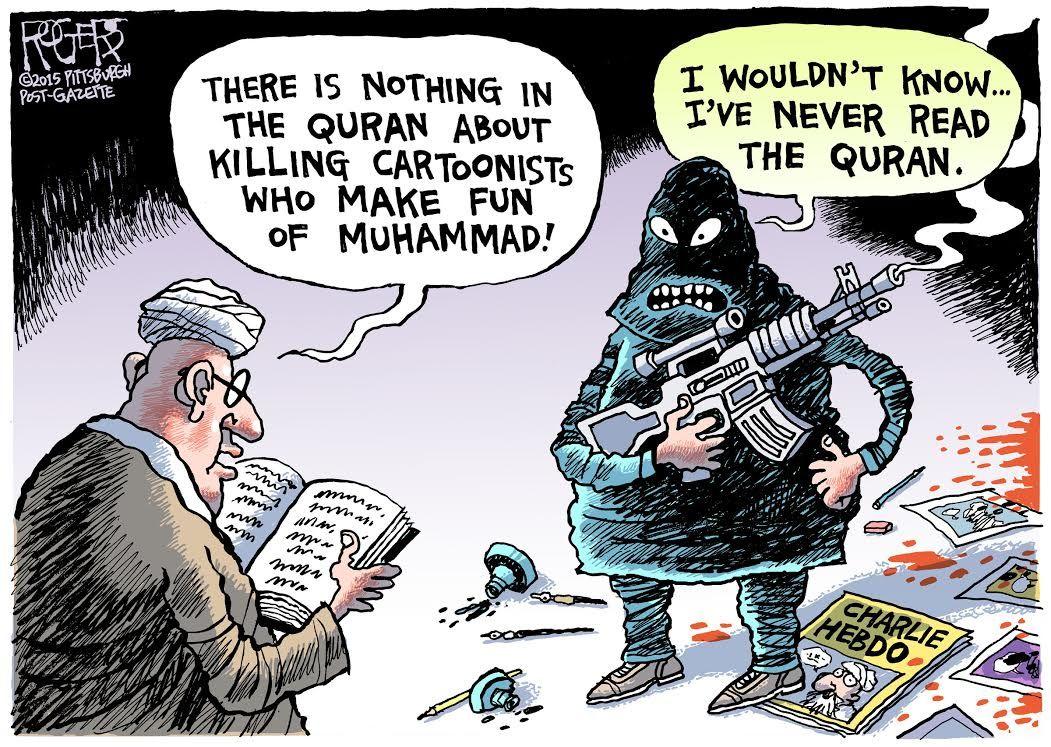The Pen is Mightier: Local satirists’ take on Charlie Hebdo


Humor can often be the best avenue to truth, according to local satire writers and experts.
Following Wednesday’s terror attack on the Paris-based satirical newspaper Charlie Hebdo, French and global citizens have responded to the tragic massacre by adopting the slogan “Je Suis Charlie,” or “I Am Charlie,” as a sign of public solidarity. In the aftermath, Pittsburgh’s own satirists have reflected on the value and potential consequences of poking fun in the name of justice.
The Pittiful News, which exists as a “nice, crisp newspaper,” says Editor-in-Chief Steven Boyd, is three-years-old and publishes satirical news articles similar to The Onion.
Boyd has expressed remorse for the victims of the attack, saying, “the Charlie Hebdo shootings demonstrate the risk that comes along with picking battles through print speech.”
Paris-born jihadists, now being identified as brothers, killed 12 employees in the office of Charlie Hebdo on Jan. 7 as a way of avenging the defilement of Islam, according to the Associated Press. The satirical weekly had previously featured cartoons about Muslim extremists and Islam.
Cartoonists at Charlie Hebdo were well-known in France for printing edgy cartoons that humanized the prophet Muhammad, including changing the paper’s name in one issue to Charia Hebdo as a play on the Islamic Sharia law.
The Pittiful News, Boyd said, is careful to be respectful of subjects in its satire.
“When big-time production writers choose to attack terrorist groups, there is a massive risk,” Boyd said. “We have always amended our practices when issues arise in order to be respectful to the community.”
Despite editors’ precautions, the genre will always offend someone, says Mark Kemp, an English academic adviser who has taught satire courses.
“People don’t get the point sometimes. That’s irony,” Kemp said.
The Pittiful News has touched on serious issues, such as religion on college campuses. With headlines like “Fox News to Offer Degree in Islamophobia,” the paper highlights, rather than perpetuates, the absurdities of racism — a mission well-handled with humor, Boyd said.
“In my mind, satire intends to make society confront its values regardless of how sacred they are. In a way, satire is almost like science — everything must be questioned,” Boyd said.
What some may find provocative, however, others may find insulting.
French officials had previously warned writers at Charlie Hebdo that their digs against Islam were provocative, the AP reported. In 2012, editors printed nude depictions of the Prophet Muhammad, prompting riot police to guard the office. Prime Minister Manuel Valls stated late last year that France was facing “an unprecedented threat” in the face of a rising number of Muslim extremists in France.
Writers and cartoonists at Charlie Hebdo, nevertheless, amped up their Islam-related cartoons, and some writers received police protection because of threats.
So, is it more the goal of present-day satire to make a stir rather than to question norms?
“To be honest, to know that your writing has upset somebody can be very troubling,” Boyd said. “It runs so counter to the mission you have established to give someone something they’ll enjoy.”
Regardless of the ethics of controversial satire, the tragedy in France has opened global debate on free speech. American and French citizens have publicly demonstrated their support of satirical press and entertainment recently.
Satire is “absolutely essential to any culture,” Kemp said.
“It has always been around and has always been a component of a fair and civil society,” he said.
For Hannah Lynn, senior editor and writer for The Pittiful News, this incident isn’t a matter of amendment rights.
“A lot of people are angrily calling it a violation of free speech, which it’s not. People tend to jump on the free speech bandwagon without considering what they’re defending,” Lynn said. “Charlie Hebdo had very Islamophobic and racist cartoons.”
Lynn pointed to the recent film “The Interview,” starring Seth Rogen and James Franco, as a potentially offensive piece of satire. “The film isn’t a groundbreaking piece of art,” she said.
“Maybe it’s satire to make fun of the most brutal dictatorship, but also maybe not,” Lynn said.
Pittiful News writer Ben Wahlberg agreed that the staff must take care to not offend.
“There’s an important line between being satirical and being offensive. Making jokes at people’s expense is for tabloids,” Wahlberg said.
There are fundamental differences between the value of free speech in the United States, versus other nations, according to Michael West, an English professor with a background in satire.
“France is not the USA. France is not an Islamic society. How far the French value free speech remains to be seen. It’s certainly a cardinal American value enshrined in our Constitution,” West said.
The United States holds freedom of speech to a slightly different standard than France.
While the European Convention on Human Rights protects citizens’ freedom of expression, the International Covenant on Civil and Political Rights outlaws “any advocacy of national, racial, or religious hatred that constitutes incitement to discrimination, hostility, or violence.”
Cartoons, flagrant or not, don’t condone the tragic recent events in Paris, Kemp said.
Cartoonists and writers can use media to “reproduce the kind of hate speech they abhor,” he said, and the Charlie Hebdo cartoonists went too far.
It’s also unfortunate for the Muslim community in Paris, he added, which will now become the target of unwarranted backlash on behalf of the extremists.
Local professional cartoonists have also identified with their overseas counterparts.
Rob Rogers, whose popular cartoons in the Pittsburgh Post-Gazette have depicted such issues as pedophilia in the Catholic Church, has incited controversy through his work.
Last Friday, Rogers printed a cartoon depicting a jihadist, fully armed and standing amid blood and Charlie Hebdo publications, admitting he has never actually read the Quran.
“Even before the Charlie Hebdo attacks, I was thinking about the idea of radical Islam and thinking, ‘there’s got to be a way I can talk about the Quran, and the fact that there’s nothing in there that says this is OK,’” Rogers said.
A letter to the editor in Saturday’s Post-Gazette fired back at Rogers for defending Muslims, arguing that he wouldn’t do the same for a Christian.
Although Rogers receives substantial response from his cartoons, including vague anonymous threats, he has never feared for his life.
“It’s my job to push the boundaries,” Rogers said. “Even though I wasn’t doing the exact same kind of political cartoons as Charlie Hebdo, you can support free speech without engaging in the same kind of speech.”
Religion is a hot-button topic among political satirists, and responses to it can vary depending on the demographics of the area in which it’s published. France’s Muslim community has grown in number and so has the number of French citizens being recruited to Jihadism.
“In a free society with no established religion, all religions and atheism should be free to publish satiric criticism of each other,” West said.
The most common answer from satire experts and writers when asked about the importance of satire is simply that it must exist.
In an analogy that describes those in power as a human and those who publish newspapers as dogs, Rogers described the cartoonist as “the teeth that clamp down on the leg.”
He added that cartoons offer even the illiterate a chance at fighting injustice, due to the “power of an image.”
In the face of international controversy, The Pittiful News staff remains hopeful about the importance of satire and doesn’t foresee an end to the genre.
“People are really defensive about satire right now, but they don’t need to be. It should always exist, and it always will, and no one is saying otherwise,” Lynn said.
Editor’s Note: A previous version of this story said The Pittiful News publishes satirical news articles similar to The Onion and Charlie Hebdo. The Pittiful News does not print articles similar to Charlie Hebdo, and the article has been corrected to reflect as such.
Recent Posts
SGB addresses concerns about ICE presence on campus, hears SJP lawsuit against administration, approves governing code bill
At its weekly meeting on Tuesday at Nordy’s Place, Student Government Board heard concerns about…
ACLU of Pennsylvania sues Pitt over SJP suspension
The ACLU of Pennsylvania filed a federal civil lawsuit against the University of Pittsburgh and…
Marquan Pope: The ultimate shark
One of the most remarkable things about sharks is that an injury doesn’t deter them.…
Who Asked? // Do we really get a summer vacation?
This installment of Who Asked? by staff writer Brynn Murawski mourns the seemingly impossible perfect…
Notes From an Average Girl // Notes from my junior year
In this edition of Notes From an Average Girl, senior staff writer Madeline Milchman reflects…
Meaning at the Movies // The Power of the Movie Theater
In this edition of “Meaning at the Movies,” staff writer Lauren Deaton discusses her love…

